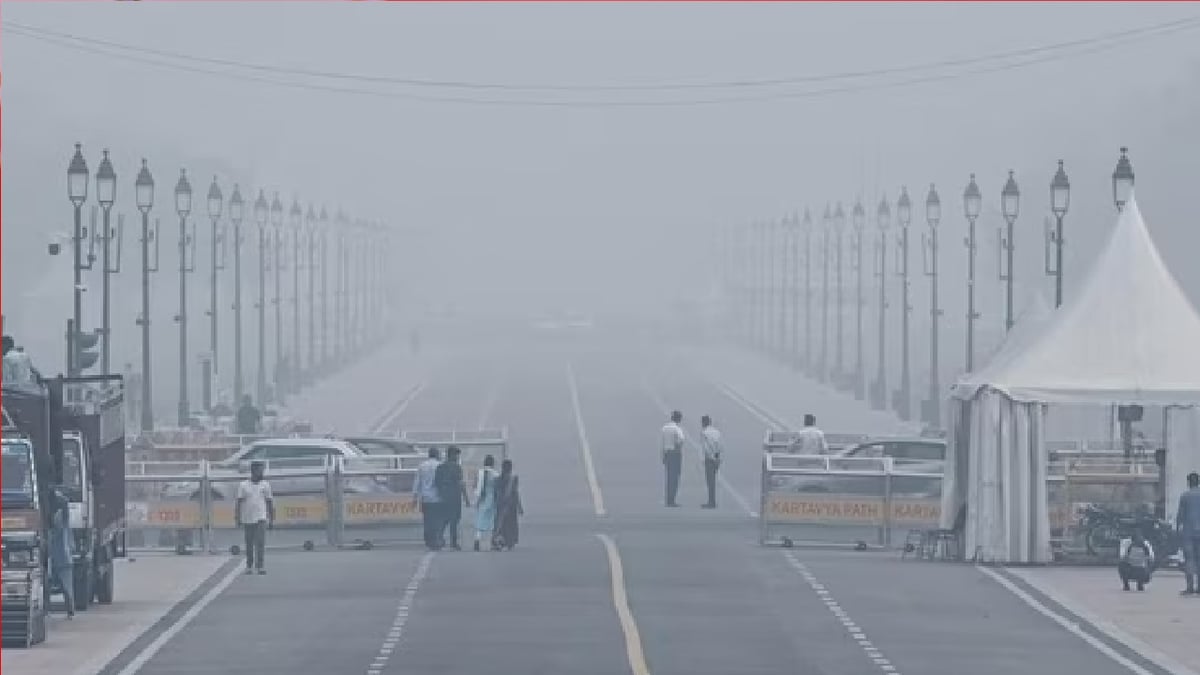New Delhi : It is difficult for people to even breathe in India’s capital Delhi. The air quality here has become so severe that now people are suffocating due to the blanket of poisonous smog. According to media reports, the blanket of poisonous smog covering the Delhi-NCR sky became denser on Wednesday and the air quality once again reached the ‘severe’ category amid adverse weather conditions.
Delhi’s AQI 401
The report said that the Air Quality Index (AQI) recorded every day at 4 pm in Delhi during the last 24 hours was 401. It was 397 on Tuesday. AQI was 358 on Monday and 218 on Sunday, 220 on Saturday, 279 on Friday and 437 on Thursday. Along with this, very poor air quality was also recorded in neighboring cities Ghaziabad (AQI 378), Gurugram (297), Greater Noida (338), Noida (360) and Faridabad (390). Let us tell you that AQI between zero to 50 is ‘good’, between 51 to 100 is ‘satisfactory’, between 101 to 200 is ‘moderate’, between 201 to 300 is ‘bad’, between 301 to 400 is ‘very bad’. Between 401 and 450 is considered ‘severe’ and above 450 is considered ‘extremely serious’.
Government’s measures are not working
Despite the Delhi government taking several stringent steps to control pollution, including a ban on construction work and entry of diesel trucks in the city, Delhi’s air quality has deteriorated in the last few days. According to IQAir, a Swiss company specializing in monitoring air quality, on Tuesday Delhi was at first place, Dhaka second, Lahore third and Mumbai fourth in the list of the world’s most polluted cities.
Burning of stubble is also making the air bad
According to a system developed by the Pune-based Indian Institute of Tropical Meteorology to identify the contribution of different sources of pollution, stubble burning incidents accounted for 23 per cent of air pollution in the national capital on Wednesday. It is expected to be 11 percent on Thursday and four percent on Friday. The data also revealed that transport, another major cause of pollution in Delhi, has contributed 12 to 15 percent to Delhi’s bad air in the last few days. According to Delhi Pollution Control Committee (DPCC) analysis, pollution peaks in Delhi from November 1 to 15, when the number of stubble burning incidents increases in Punjab and Haryana. On Wednesday, 2,544 incidents of stubble burning were recorded in Punjab. , taking the number of such incidents to 30,661 since September 15. Delhi’s air quality is the worst among the world’s capital cities.
Central Government’s GRAP will continue
An official of the Commission for Air Quality Management (CAQM) said that the final phase of the central government’s air pollution control scheme will continue till further orders. This is called Gradual Response Action Plan (GRAP). Under this, strict steps have been taken including ban on construction work and entry of polluting trucks in the national capital.
There will be less movement of government vehicles
Earlier this week, Delhi Environment Minister Gopal Rai had said that if the AQI crosses the 400 mark, the Delhi government may implement an odd-even scheme to limit the operation of vehicles. The government had last week postponed the implementation of the odd-even scheme after Delhi’s air quality improved significantly due to rain on Friday. Under the scheme, cars are allowed to operate on alternate days depending on the odd or even last digit of their registration number.
poisonous smoke dissolved in breath
Doctors say that breathing Delhi’s polluted air is equivalent to the harmful effects of smoking about 10 cigarettes a day. He said long-term exposure to high levels of pollution can cause or worsen asthma, bronchitis and serious respiratory problems and increase the risk of heart disease. Adverse meteorological conditions, along with vehicle emissions, paddy-straw burning, firecrackers and other local pollution sources, contribute to hazardous air quality levels in Delhi-NCR (National Capital Region) during winter. According to a report compiled by the Energy Policy Institute (EPIC) at the University of Chicago in August, air pollution is shortening the life span of people in Delhi by nearly 12 years.

